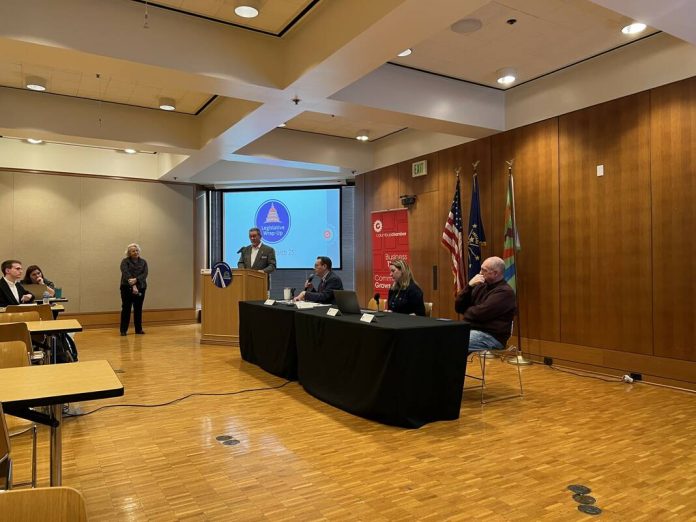
Photo by Brad Davis | The Republic Bartholomew County legislators Rep. Ryan Lauer, R-Columbus, Rep. Jennifer Meltzer, R-Shelbyville and Sen. Greg Walker, R-Columbus, talk about the just concluded legislative session at the Columbus Area Chamber of Commerce legislative wrap-up session Monday.
Bartholomew County legislators met with local business leaders and constituents at a Columbus Area Chamber of Commerce-hosted “legislative wrap-up session” at Columbus City Hall on Monday morning.
The legislators gave their thoughts on the previous session that just concluded and provided an idea of what their priorities will be heading into the next legislative session.
Sen. Greg Walker, R-Columbus; Rep. Ryan Lauer, R-Columbus; Rep. Jennifer Meltzer, R-Shelbyville attended the event. Rep. Jim Lucas, R-Seymour, was invited but did not attend.
When asked by moderator John Foster about focuses for next session, Walker discussed taking a look at the state tax structure: “ … whether that is going to mean changes in how we try to influence locals to rely more on local income tax options as opposed to property tax options, I’m just throwing it out, I’m not saying I’m agreeing or disagreeing with this at this point.”
Lauer said he too would like to “look at” the structure and mechanism of property taxes across the state, and advocated for the repeal of the business personal property tax.
All three talked about finding some sort of solution after the state’s Medicaid expenditure forecast was off by nearly $1 billion when the two-year state budget was passed last April. WFYI reported the error was mostly due to home and community-based long-term care services, which were popular during the pandemic. The continued demand for those services were not reflected in funding estimates that legislators received, causing the shortfall.
“We enter the next budget cycle with an expectation that because we administer some dollar matching programs for those providing care for the most profoundly disabled community, providing some home care, some reimbursements there, we had a program that just didn’t have the right ceiling on top of it,” Walker said. “It’s the right thing to do, but we spent $884 million more than we intended to the first year.”
Of the the states’ $43 billion budget, 18% is going towards Medicaid, Lauer pointed out.
Meltzer said details about what they will do next session partly depends on who is elected governor in November, but agreed that Medicaid was something she wanted to address.
“We definitely need to take a closer look at Medicaid and make sure that we’ve providing care and treatment to those who absolutely need it, especially when they are down and trying to get back on their feet. But at the same time, we can’t be going over budget like that,” she said.
Foster asked the group about water rights, a subject that has gained attention statewide due a paused Indiana Economic Development Corporation (IDEC) proposal to pump water from Tippecanoe County to the LEAP industrial complex in Lebanon.
Walker called water resources “critical,” particularly regarding local development. The Honda manufacturing plant in neighboring Decatur County sources water from Bartholomew County well fields, which Walker said “does show proper vision and understanding of regional application of economic growth and development. But it also has the potential to pit counties against each other.”
“Indiana, I believe, really needs to take the time to create an assessment plan that allows us to give water rights consideration to anything we do now at IEDC, so that we know we’ve got local resources to deal with those kind of issues,” Walker said.
Decisions on what to do when a business has excess water requirements is something that should remain with local officials, Lauer said.
“That should be a local decision. And I know that here we partner with our businesses that have excess water requirements or some of those requirements, and that’s the right thing to do, so we need to support that,” Lauer said.
“We don’t have a great system set up in any of our agencies from DNR to IDEM to really say how we’re going to control who gets the water, it’s all pretty much controlled at the local level, which is great,” Meltzer said on the topic. “Most things I think should be 100% controlled on the local level. This one’s interesting, because as Senator Walker says, it’s going from county to county, so if your counties work together and have an inter local agreement and come up with something that works as well.”
Mayor Mary Ferdon attended the session and took a moment to thank the legislators for various legislation they worked on pertaining to child care, housing and public notices, but chimed in on water rights too.
“As you talk about water rights, please continue to keep local government leaders engaged because the tax structure obviously affects what we’re able to do,” Mayor Ferdon said. “And oftentimes state legislators don’t go to the people who, not you necessarily, but don’t often go to local leaders who are the ones who have to deal with the tax structure changes or the loss of rights. So just continue to keep those lines of communication open.”




